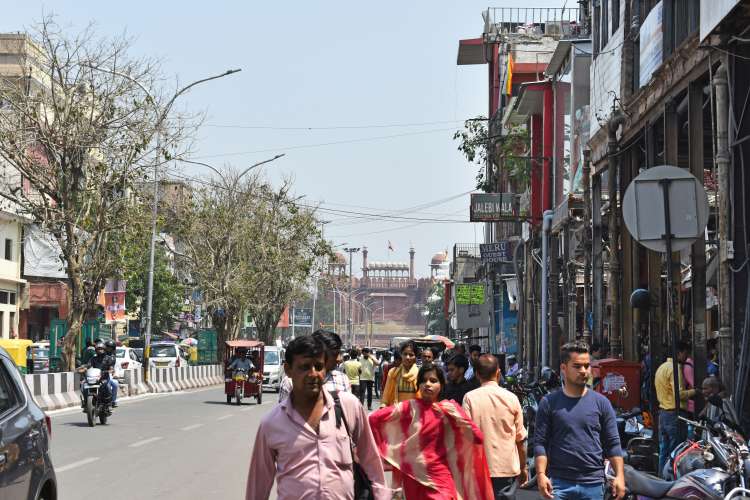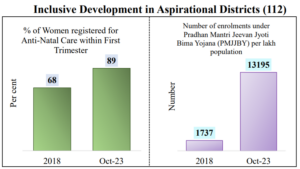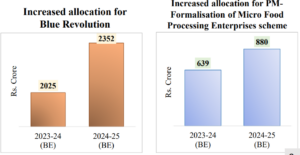
As India gears up for the upcoming elections, it is crucial to focus on the economic strategies that could shape the country’s future as a potential global superpower. The current government, hopeful for a third term, is promising a series of bold reforms aimed at boosting economic growth. This vision is supported by leading economists and industry experts who stress the need for significant changes to accelerate India’s economic momentum.
India is already the fastest growing major economy, but sustaining the growth momentum requires substantial reforms and an inclusive strategy. Unfortunately, the state of coordination between state governments and the Union government has been less than ideal. Without enhanced cooperation, it is virtually impossible to achieve India’s full economic potential.

Since the annoucement of economic reforms in 1991, India has witnessed a remarkable economic transformation. GDP has quadrupled, foreign exchange reserves have skyrocketed from $5.8 billion to $648.6 billion at present, while incidence of poverty has significantly declined. However, challenges like income inequality and rural stagnation persist, demanding further reforms for truly inclusive growth.
READ | Lost in translation: Migrant workers’ healthcare rights still a chimera
Agriculture revolution 2.0
Dr Charan Singh, CEO and Founder Director of the EGROW Foundation, says agriculture as a critical area where reforms are needed. The sector, still dependent on monsoon rains and natural irrigation methods, needs modernisation. Strengthening drip irrigation and re-evaluating crop patterns to match regional resource availability are vital. For example, growing paddy in Punjab is not optimal. The government should also promote the production and consumption of nutritious crops like millets.

Comprehensive land and labour reforms are a long-standing demand of the industry. The government has identified value addition and productivity enhancements as key areas, and has acknowledged that processing agricultural products into higher-value goods will increase farmer profits and create more jobs. Access to better seeds, fertilizers, and irrigation systems is also crucial.
Dr Aruna Sharma, a development economist who has served as secretary of the government of India, argues that food security should extend beyond grain distribution to include nutritional education and access to nutritious foods to eradicate malnutrition and hunger within five years.
Capital expenditure push
Finance Minister Nirmala Sitharaman has announced a significant increase in capital expenditure in the Union budget for the current financial year, highlighting the importance of improved infrastructure—such as roads, bridges, ports, and power grids — for attracting investments and boosting economic activity. Dr Sharma also stressed the importance of financial inclusion, enhanced net connectivity, and better road infrastructure to support economic growth.
The government views financial inclusion as an integral part of its economic strategy. Over the past decade, significant strides have been made in digital payments, eliminating cash and check-based government transactions. However, there remains a pressing need to expand access to a wider range of financial services, including credit, savings accounts, insurance, and provident funds. Such measures would bolster economic security for individuals and facilitate broader economic growth.
Incentivising the industry
The government cannot shoulder the burden of economic progress alone – industry collaboration is central to achieve this goal. Businesses should leverage the current economic momentum by increasing investments, expanding into new markets, and adopting innovative technologies. Dr Sharma noted that encouraging industrial growth requires facilitating capital investments and bank credit.
Dr Singh suggests that adopting a cluster approach, offering quick clearances, tax holidays, and export subsidies could boost industrial production. This needs to be the focus of government policies in the next five years.
Boosting exports
Exports deserve special attention. There is a need for more export processing zones and financial support to achieve economies of scale. Identifying and targeting production for high-demand goods in international markets is crucial. This can be made possible by consistent and credible export policies, and avoiding ad hocism in export strategies.
To address environmental concerns, the government must foster an industrialisation model that prioritises sustainability. Instead of imposing bans, providing incentives for industries to adopt cleaner and more sustainable practices is seen as a more effective strategy. This approach would not only help mitigate environmental impact but also align with global trends towards greener economies.
The education system must align with the needs of a developing economy like India. A comprehensive overhaul is necessary to create jobs for a well-educated labour force, thereby preventing resource wastage. Finance Minister Sitharaman also highlighted key sectors for future growth, including space, artificial intelligence, logistics, and tourism, aiming to position India as a leader in these fields.
The government is facing criticism for repetitive schemes that do not effectively address critical issues like India’s position on the hunger index, poverty, unemployment, and environmental concerns. The focus should be on responsible industrialisation practices, not restrictive bans. For India to become a global economic superpower, an approach that involves strategic reforms, industry collaboration, and comprehensive educational restructuring is essential.
Prachi Gupta is an Assistant Editor with Policy Circle. She is a post graduate in English Literature from Lady Shri Ram College For Women, Delhi University. Prachi started her career as a correspondent with financialexpress.com. She specialises in policy impact studies.

